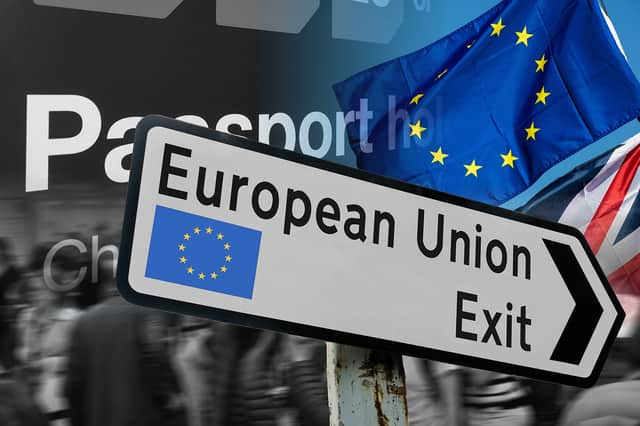Bregret: Leave voters blame Brexit going badly on failure of UK politicians as rejoin support increases
and live on Freeview channel 276
Unhappy Leave voters blame Brexit going badly on UK politicians, like Boris Johnson and Theresa May, for not getting a good deal, researchers say.
However, only 16% of Brexit voters would now vote to rejoin - despite more than half saying leaving the EU has either not turned out well or it’s turned out badly or very badly. This comes from a survey and series of focus groups in May and June carried out by UK in a Changing Europe and the consultancy Public First. It found people associate travel delays, increases in the cost of living and staff vacancies in health and social care to “some extent with Brexit”.
Advertisement
Hide AdAdvertisement
Hide AdA new poll shows that support for rejoin has reached its joint-highest level over the last year. According to WeThink, it’s reached 63% while the figure of those who want to stay out of the EU is at 37% - those who don’t know have been excluded.


However Seb Wride, director at Public First who contributed the Brexit regret research, said it would be a mistake for political parties to read too much into support for rejoin. He told NationalWorld: “It’s a mistake to read the current lead in polls that pro-Remain sentiment has over pro-Leave as evidence parties should be campaigning for rejoin.
“A majority of Leave voters believe that Brexit will work out in the long-run, and are more likely to think that Brexit was bungled than doomed to fail. Calling for a new referendum would be a risk for any of the parties, opening them up to all sorts of arguments about the concessions the UK would need to make to the EU, ignoring the key issues at the moment, and adding further fuel to the view that politicians these days cannot be trusted to deliver.”
The Exploring Bregret research found that “most Leave voters do not regret their vote”. This was backed up in the focus groups, with a female voter, in her 30s, from Thurrock, Essex, saying: “So, I don’t regret it, but I do wish that we had had stronger people representing us to make the deals a bit more and not cave in so quickly.” A male voter in his 60s, also from Thurrock, said: “Do I regret it? No, we’ve started on this journey, let’s finish the journey.”
Advertisement
Hide AdAdvertisement
Hide AdLeave voters clearly blame Brexit going badly on politicians. Almost half say there was a way politicians could have made it work, but “they did not even try”. Almost two-thirds of Leave voters who think the EU exit has gone badly say UK politicians were ineffective and failed to get a good deal, while 50% say the UK gave in too much to EU demands.
While many Remain voters may think that political parties such as Labour and the Liberal Democrats should push more strongly to rejoin the EU, as this research shows there is a lot of apathy towards Brexit as an issue at the moment. It's gone from being by far the most important issue for voters in 2019, to behind a whole swathe of things such as the economy, the NHS, immigration, crime, climate change and much more.
This has led the Labour leader Sir Keir Starmer to do a complete pivot. In 2019, as Shadow Brexit Secretary, he argued that if Labour got into power there should be a second referendum. However, now - after Boris Johnson's convincing win after campaign to "get Brexit done" - Starmer has said there is "no case" for rejoining the EU, single market or customs union.
Even the Lib Dems - traditionally the most prominent pro-EU party - have backed off on Brexit. The party's candidate in Thursday's Mid Bedfordshire by-election Emma Holland-Lindsay, dodged the question when I asked her simply - what relationship should the UK have with the EU? She told me: “My focus on this election is delivering on the priorities for the people of Mid Bedfordshire, when I’m knocking on doors primarily what they’re focusing on is being let down by the Conservatives.
“People do accept that the deal we’ve got with this Conservative Party is not delivering for people, however actually my top priority is about things like healthcare services and the cost of living crisis - because those are the things that people in Mid Beds are really concerned about, and they’re seeing the impact every single day.”
A female voter in her 50s, from Ashfield, Nottinghamshire, told researchers: “David Cameron went away the minute the results came back. Theresa May was always anti-Brexit, but tried to do her best with it, but didn’t really get very far. Boris was Boris.”
While a similar-aged woman from Thurrock added: “[Brexit has] changed the way I vote because I don’t trust any of them [politicians], I don’t believe a word.”
However the report found that “by far the dominant feeling among former Leave voters- even those unhappy with the course of Brexit- is ambivalence”. The researchers said that “most people do not appear to have given the referendum and its aftermath much thought at all”.
Comment Guidelines
National World encourages reader discussion on our stories. User feedback, insights and back-and-forth exchanges add a rich layer of context to reporting. Please review our Community Guidelines before commenting.
